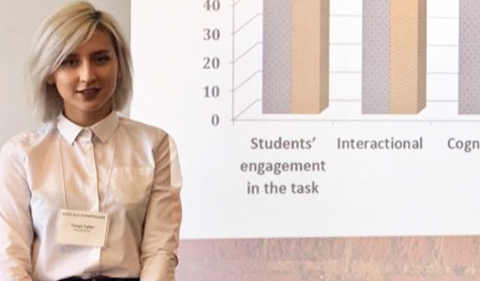
Tetiana Tytko Presents on Language Learner Engagement with Technology at the SLA Student Symposium at the University of Wisconsin–Madison
Graduate student Tetiana Tytko describes her decision to come from Ukraine to study in the M.A. in Applied Linguistics program at OHIO University as “life-changing.”
Tytko already earned an M.A. in English Philology in her home country, but she regretted never presenting the results of her thesis—recognized by her professors as one the most innovative—at a conference.
“I graduated with the feeling that no one benefited from my research. Back in Ukraine, I was convinced that conferences existed only for distinguished professors or at least people with Ph.D.s. I was surprised that in American institutions, even undergraduate students can present their posters and papers alongside their advisers and professors.”
So when during her first semester at OHIO she discovered that second-year linguistics graduate students were presenting at different prestigious conferences, Tytko saw an opportunity and was curious what they were presenting. She asked them how they had chosen their research topics and what advice they had for her.
“All of them recommended choosing the area that would fascinate me. They urged me to do the research not just for a class grade, but as something that I could present in the future.”
Tytko became fascinated by the intersection of two classes she was taking — Second Language Acquisition and Computer-Assisted Language Learning. She noticed that technology is ubiquitous, and she considered herself to be a digital immigrant, admitting, “I did not know at first how to turn on a Mac computer!” But she caught on quickly.
An experience tutoring in the English Language Improvement Program’s Undergraduate Writing Lab gave her access to international students, and after discovering the importance of student engagement in the language learning process, she decided to test learner engagement in technology-mediated and traditional tasks. Based on previous research, her hypothesis was that L2 (second language) learners’ engagement would be higher in technology-mediated tasks.
“Surprisingly,” she said, “most of the students were more engaged in completing traditional tasks.”
With the encouragement of her Second Language Acquisition research and theory professor, Dr. Soomin Jwa, Tetiana submitted a proposal to the SLA Symposium at the University of Wisconsin-Madison. “I was so surprised and happy when I got accepted for the conference in just my second semester.” At the conference, Tytko shared her graduate research with the SLA community and received much beneficial feedback from students and professors.
“Most importantly,” she noted, “I made new connections. Numerous people were interested in my research findings,” she added, “and raised concerns as to what extent technology should be integrated into a classroom.”
As a result, Tytko has a new direction for her study. This summer, she is conducting new experiments with participants from Turkey, Japan, and Korea.
“I am going to increase the sample size and run a statistical analysis. My plan is to acquire and analyze more data for presenting at conferences this fall. I believe that the SLA Symposium was a great start that provided me with an invaluable experience that will further help me transform my presentations into publications.”
Tetiana was grateful that the Linguistics Department supports graduate students with travel grants.
“I am happy that I had an opportunity to present my research, represent Linguistics at OHIO, and gain insights for the future. This made me realize that I am doing something relevant and my findings can contribute to both CALL and SLA research.”



















Comments